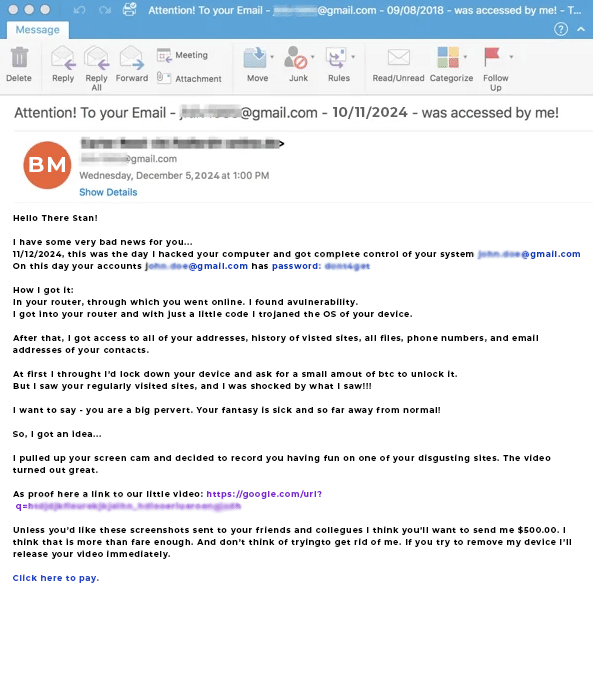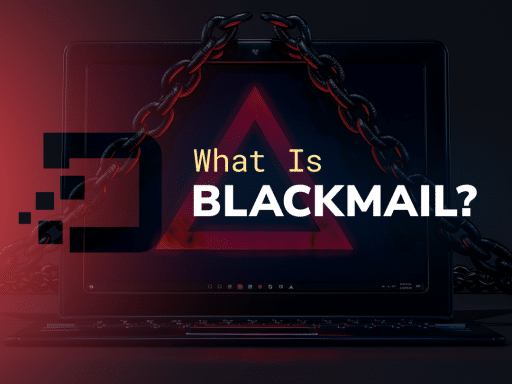Webcams have become a basic and essential tool, breaking down barriers between people and places. They help us at work and play, bringing us closer together. Since COVID-19, webcams have become indispensable, making our lives easier and more connected. But how much do we think about their reliability? Can we trust these devices with our image, or do they invite intruders and threats of webcam blackmail?
These possibilities are all too real when you’re the victim of webcam blackmail. And you might be thinking, “What choice do I have? I must give in to their demands to ensure my privacy.” But hold, there is a better way to handle blackmail online.
Does Webcam Blackmail Actually Happen?
Yes, webcam sextortion and webcam leaks can happen. But it requires a number of factors. Older operating systems, laxed security and antispyware, or some type of malware would be required for this to be true.
But, after being threatened, it is easy to believe that this is something which could have happened. It is important that you remain calm and develop a plan to take immediate and direct action. Begin by asking yourself, who is this person and what do they really know about me? Where are they contacting me from?
Start saving evidence through screenshots of your online interactions with the profile and documenting where the threat came from. Focus on collecting evidence. Keep all messages, emails, or chat logs from the person. Capture screenshots of any messages or social media posts. All this information could work as evidence and might help you determine the validity of the threat.
Webcam Blackmail Can Be Part Of A Bulk Email Extortion Scam
Data collected by Digital Forensics Corporation showed that less than 10% of the reported cases of email sextortion in 2024 involved actual compromised webcams. Most of

these cases where actually phishing attempts using the threat of exposure through a leaked webcam. These phishing emails are common are labeled the “Hello Pervert Email”, and is an indicator that your data may have been compromised in a corporate data breach.
When a corporate data breach occurs, many emails fall into the hands of scammers. These cybercriminals will leverage and use this information along with anything else they may be able to find to send threats. The goal is not to expose, as they likely have no real content, their goal is to ensure you click on the link they have cleverly disguised in the body of the message.
If You Suspect Your Webcam Has Been Hacked
If you suspect the communication you were sent is valid and your web camera is now compromised, stop using it immediately. Contact a cybersecurity firms that can perform a proper scan of your device. This is also a good measure if you clicked a link in the phishing email.
Is There Danger of Exposure?
If you’ve shared intimate content with anyone, there is a risk of potential exposure, whether through a sextortion email or direct outreach via social media or messaging applications. If this is happening to you, be honest with yourself and reflect on any conversations you’ve had with unknown profiles. If there’s a chance that your intimate content may be compromised, it’s important to take quick action to protect both your privacy and reputation. Sextortion can take many forms, leveraging content you’ve sent directly or content created using your images with deepfake technology.
Services That Help With Exposure From Webcam Blackmail
First and foremost, give yourself some time after being threatened. Use delay tactics to buy yourself some time while you seek professional online blackmail help. Do not rush into conceding and sending money. Take the time to do your research and review your options. Responding immediately could give your scammer a signal that they need to escalate the frequency or harshness of their threats.

Working With Law Enforcement
It’s always a good idea to file a police report or get in contact with the corresponding authorities. We are aware that their effectiveness may be limited if the criminals are based in another country, however, it is an essential first step. If you are a US citizen please contact the FBI’s Internet Crime Complaint Center (IC3).
Working With Digital Forensics Corp.
At Digital Forensics Corp (DFC) we are dedicated to investigating cybercrime, including webcam online blackmail. Our team can help you identify whether it’s a real sextortion email or if it’s part of a bigger fraud scheme. We offer a number of services, from device scanning to e-mail header analysis, to assist you in understanding your exposure and potential next steps to preserve your privacy.
When you first contact DFC, here’s what we suggest you do:
Preserve the evidence: Do not erase any messages, videos, or conversations. Preserve screenshots, email headers, and any messages from the extortionist. Take a screenshot of everything. We do not require access to the explicit content you’ve shared to track down the perpetrators. Our approach to addressing these attacks is highly discreet.
Do not respond: Avoid engaging with the scammer. Don’t block the person or the profile where the threats are coming from, as it might interfere with the investigation.
Contact us straight away: The sooner you contact us, the quicker we can begin our investigation and secure your system.
Our team of experts is ready to help you navigate this difficult situation, providing both the technical expertise and support you need. Webcam sextortion is an offense that capitalizes on secrecy and embarrassment. The individuals targeted by this crime frequently endure their suffering quietly, hesitant to seek assistance due to the consequences. However, the outcomes of not taking action can be dire, resulting in devastation, distress, and a significant loss of autonomy.
Don’t allow yourself to be controlled by webcam blackmail when shaping your future. Connect with Digital Forensics for a discussion. Allow us to stand by your side in combating this crime. Your safety, privacy, and peace of mind mean everything to us.
Sources:
- Sextortion: What Kids and Caregivers Need to Know | FBI
- Organized sextortion led four British men to suicide | Help Net Security
- About Us | National Center for Missing & Exploited Children
DISCLAIMER: THIS POST IS FOR INFORMATIONAL PURPOSES ONLY AND IS NOT TO BE CONSIDERED LEGAL ADVICE ON ANY SUBJECT MATTER. DIGITAL FORENSICS CORP. IS NOT A LAWFIRM AND DOES NOT PROVIDE LEGAL ADVICE OR SERVICES. By viewing posts, the reader understands there is no attorney-client relationship, the post should not be used as a substitute for legal advice from a licensed professional attorney, and readers are urged to consult their own legal counsel on any specific legal questions concerning a specific situation.
The information presented in this article is based on sources that are not readily available to the public and may be subject to restrictions or confidentiality. It is intended for informational purposes only.






